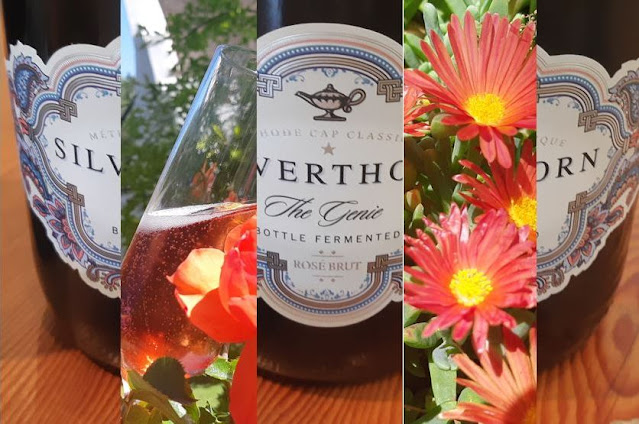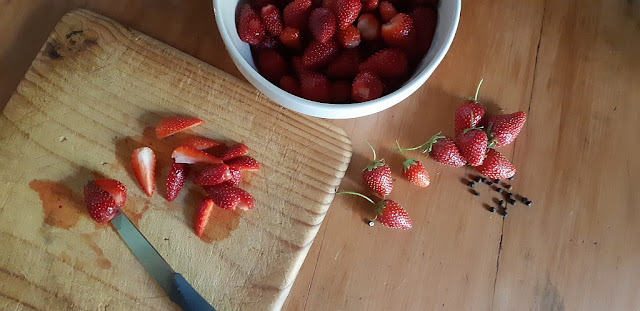When I received an olive alert on WhatsApp
from our friend Susan, I was pleased to learn that this year I could get green
Manzanilla olives. I had long wanted to make pimiento stuffed olives but had to
wait for a time when I could use green olives.
The green olives, stuffed with red pimiento,
had always made me think of Spain. I learned that the pimiento stuffed green
olive, probably originated in France in the 1700s. I will have to research a
bit more. I would have thought the origin to be Spain, from where the
Manzanilla olive and pimiento were cultivated.
The pimiento stuffed olive is synonymous
with the martini. For me, the olive is an integral part of the martini. Their
salty flavour adds something to the cocktail. The stuffed olive is best because
it soaks up more of the gin and vermouth, making it something to savour at the
end of the martini.
On Saturday, Susan and Michael arrived for
our first socially distanced lunch with them. Susan shared her culinary
expertise in the form of delicious cake and spring inspired desert. In
addition, there were the much anticipated 10 litres of cured olives. I put the
olives aside and promised that they would receive my undivided attention the
following day.
The socially distanced al fresco lunch was
served on the lawn tables spaced 3,5m apart with a serving table between. The
arrangement made for a relaxed afternoon. We caught up on the eight months of
various stages of lockdown that have passed since our last visit. Being able to
spend an afternoon with friends was a reminder of the constraints we have all
endured because of the pandemic.
The following morning, after breakfast, I began
destoning the first 5 litre bucket of green olives. Not being able to find
pimiento peppers, I decided to substitute with large red bell peppers. Trying
to find a suitable recipe for homemade pimiento stuffed olives online also
seemed impossible. I decided to make up my own. I made a mental note to find
pimiento seeds, to plant for future use in pickles and dishes.
After destoning half the bucket of olives, I
realised that I would have to stop destoning and move on to stuffing the olives
if I still wanted to pickle them that day. After lunch, Keith took over the
destoning. This allowed me to focus on the stuffing and the making of the
brine. This arrangement worked well and in no time all the olives were
destoned.
After using up all the red bell peppers for
stuffing, we were left with some unstuffed olives. I decided to pickle them as
is.
Stuffed green Manzanilla olives
Ingredients:
3kg cured green Manzanilla olives
3 to 5 large organic red bell peppers
Brine:
3lt Spring water
180ml coarse sea salt
350ml white wine vinegar
5ml green peppercorns
5ml juniper berries
5ml dill seeds
4 fresh bay leaves
Combine the brine ingredients in a large
pot. Heat up but do not let it boil. Keep heated until you are ready to use.
Method:
Destone the olives and keep them in fresh
water. Cut the bell peppers in strips that will fit tightly into the space
where the olive pips were. Push the strip into the pip opening of the olive as
deep as you can. Slice off the pepper strip neatly and stuff the next olive. Continue
until the pepper strip is used up. Keep the stuffed olives in a clean bowl. There
is no need to keep them in water at this stage.
Heat the clean jars in the oven at 100°C for 10 to 15 minutes to sterilise, while you are destoning and
stuffing the olives.
Pack the olives in the warm sterilised jars.
Top up the jars with the hot brine up to 3mm from the top of the jar. Pour 2mm
of olive oil on top. Seal the jars tightly. Wipe the jars and store in a cool
dry place.
After a busy Sunday, I could add seven jars
of stuffed Manzanilla olives and three jars of destoned olives to my growing
collection of differently styled preserved olives. I like how they look on the
shelf. They are quite appealing, with their retro green and red waiting to
brighten a martini. If they are good, they might even end up in a dirty
martini.

















































